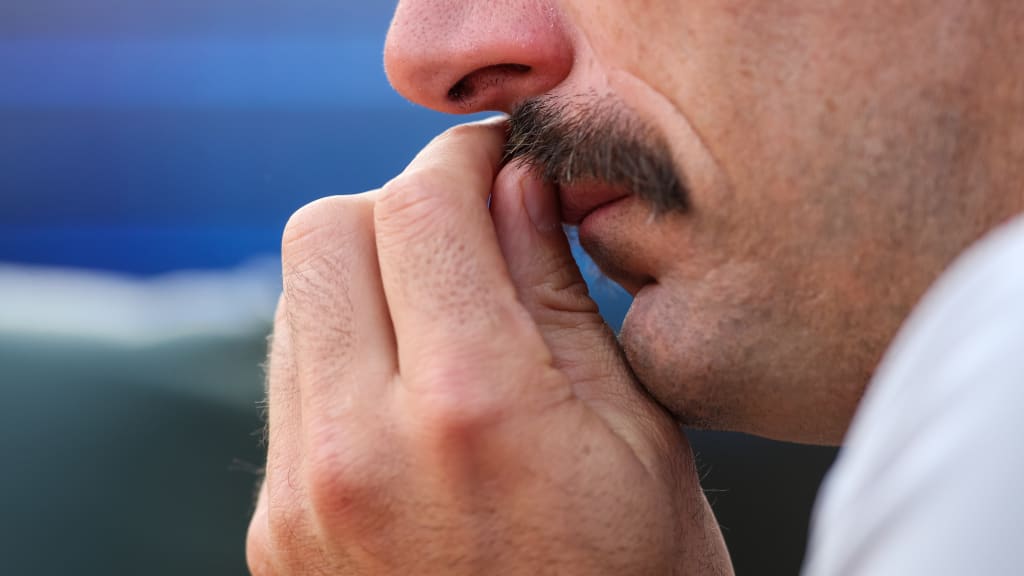Matt Carpenter has been on an absolute tear since joining the Yankees in late May.
Through 11 games, in just 28 at-bats, he has six home runs and 13 RBIs. He's the second player since 1900 to have six of his first seven hits for a new team be dingers. His slugging percentage is .964. He has an absurd 1.376 OPS.
It's a surprising resurgence after Carpenter's last few years in St. Louis, where he put up an 82 OPS+ from 2019-21. Most people probably wrote off the 36-year-old as done and, let's face it, it would've been the end to a fantastic career full of multiple All-Star appearances and World Series games. But Carp took a Minor League deal with Texas this season, got signed by New York and is looking like his old self, telling MLB.com's Bryan Hoch he owes it to "hard work" and help from "a lot of people."
But, well, there's something else a little different about the infielder this year.

"Yeah, he's got quite the fine mustache going," Dr. Allan Peterkin told me in a recent phone call.
Peterkin is a professor of psychiatry at the University of Toronto, a senior clinician scientist and a founding editor of Ars Medica: A Journal of Medicine, the Arts, and Humanities.
Most importantly, though, he's also a mustache expert.
He wrote a book in 2012 entitled "One Thousand Mustaches: A Cultural History of the Mo," and he's who people go to when they want to know how to grow a 'stache. He's even appeared on The Tonight Show to instruct Jimmy Fallon which type of lip fur the host should go with.
"This is what we call the Chevron mustache, Magnum P.I. style," Peterkin said of Carp's new facial hair. "Full, well-shaved, dark. To me, it sort of strengthens the face."
Carpenter, himself, has noted it as being an ode to Don Mattingly in interviews, which definitely makes sense when you put them side by side.
"Yeah, he grooms it properly, it doesn't go over the lip," Peterkin told me. "He definitely hit it out of the park."
And why did Carpenter all of a sudden decide to grow a mustache? Why does any man or athlete grow a mustache?
Peterkin told me that men will often grow them out of rebellion, playfulness, or, for a more recent example, out of boredom during COVID isolation. Those didn't really make sense for Carpenter, but one thing did.
"Men will often grow facial hair during a transition," Peterkin said. "You know, divorces, when they're grieving, remember Al Gore when he lost the election? He had that big bushy beard? So, it's about putting on a new face. There can be an aspect of that: I am changing my face, I'm giving myself a new face."
Sure, perhaps Carpenter was simply bored, but maybe he also wanted to have a different look after a few poor years at the end of his St. Louis tenure? He needed a change. Even subconsciously. And maybe this new, mustachioed slate has resulted in newfound success at the plate? A physical change that has birthed a new mental attitude.
"Yeah a new phase in one's life," Peterkin said. "I think that definitely could be in there."
But is that actually possible? Can there be some mental advantage to growing out a 'stache -- is there such a thing as mustache powers? There have, for some reason, been studies showing that baseball players with facial hair have outperformed their clean-shaven counterparts.
"Uhh, that might be stretching it a little," Peterkin said, laughing. "But maybe it's equivalent to war paint. You're putting this thing on and you look more ferocious. You know, he looks macho with it. He's a pretty masculine-looking guy, but he looks more masculine with a mustache. It might be off-putting [to a pitcher] or a distraction in any case."
Whatever is the cause of Carpenter getting his groove back, it's still fun when a baseball player grows out a new mustache and starts playing well -- particularly when it's a New York Yankee. There might not be any real magic in it, but there's something magical about it that can capture an entire sport's attention.
"It's amazing to me how mustaches are always a story," Peterkin said. "We're noticing it, we're talking about it. It's interesting."
